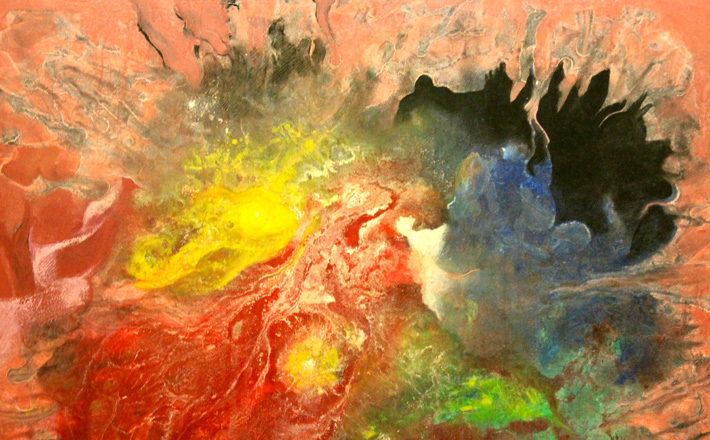Commentary on John 1:[1-9], 10-18
Words matter. In our culture, where words are cheap, or not to be weighed carefully, or that are seized upon as evidence of ideological wrongness, words matter.
We know because God created everything, us included, by simply speaking. In Genesis 1 and clearly in the background/foreground of John 1, God creates the universe(s) by simply speaking. “Let it be.” And it comes to be.
John 1 reminds us of the time when, as I have envisioned it, “God was young.” God has always been—but if we think of God as old, God was young when God spoke at Creation. Before there was anything at all, God, being fully God and with no need for anything else, spoke in love. Love speaks. Love is not quiet. Love cannot keep silent. The love within God the Trinity (can we preach on this without getting diverted into trying to explain the Trinity to skeptics?) overflowed and could not help itself. God made a world, a stupendous universe, and tender, small things like the flower in your yard, a snowflake, a child tottering by, and your own visage in the mirror.
John 1, we have to notice, just decades after Jesus the man lived and died, speaks of Jesus in sumptuous, startling, annihilating, contested terms. George Lindbeck, in his amazing book, The Nature of Doctrine, speaks of “Christological maximalism.” We cannot say enough fawning, extravagant, eloquent things about God in Christ.
The light in the darkness image invites the preacher to do peculiar things in preparing a sermon. I go outside, in the dark. I light a candle, gaze at the stars. I read this text with a flashlight. What is this light in the darkness? Doesn’t even a little bit of light, a flickering candle, banish the darkness?
Our text is heartbreaking. The puzzle, the tragedy—that God was in “the world made through him, but the world knew him not” (verse 10). “He came to his home, and his own people received him not” (verse 11). Bob Pierce, the founder of World Vision, said “Let our hearts be broken by the things that break the heart of God.” We need go no further than this week’s text. God made the world. But the world did not recognize, know, or welcome the very one to whom it owed its existence. We can blame the world. But what is that in God’s own heart? If we want to ponder what grace is about, it is right here.
Jesus was born “not of blood” (verse 13). And yet, there was blood. I continue, after Christmas, to be struck by Rachel Marie Stone’s reflection on what Jesus being born “of blood” was for Mary:
“A girl was in labor with God. She groaned and sweated and arched her back, crying out for her deliverance and finally delivering God, God’s head pressing on her cervix, emerging from her vagina, perhaps tearing her flesh a little; God the Son, her Son, covered in vernix and blood, the infant God’s first breath the close air of crowded quarters … God the Son, her Son, pressed to her bare breast … God the Son, her Son, drank deeply from his mother. Drink, my beloved. This is my body, broken for you.”
Jesus, God in the flesh, was born “not of blood”—but there had to have been lots of blood!—for you. That is the glory, not the triumphant regal poses from medieval art. I wonder odd things—like did Mary have any postpartum depression? Was Joseph as attentive as in the paintings and pageants? Was Jesus colicky in his first weeks?
John the Baptist is in John’s poetic opening as in Luke’s nativity narrative. He is always in the Christmas stories—but never in pageants, Christmas picture books, or any narrative retellings of Jesus’ birth. No wonder: he is hairy, maybe a bit unsavory, like a survivalist, hollering “Repent!” like a street preacher. Did he holler? Perhaps his tone was more plaintive, pleading, almost tearful, so loving: Please, repent. Advent was to have been a season of repentance, of “prepare him room,” and Lent is coming. Christmas perhaps should be not just joy but also mortification. God has come down to earth. Nothing could possibly be the same.
John the Baptist, despite his evident fame and popularity, was forever deferring to Jesus. Karl Barth, rather famously, kept a print of the Matthias von Grünewald painting of the crucifixion in his office. John the Baptist, anachronistically, but theologically on target, is standing at the foot of the cross, pointing up at Jesus with a bony, crooked finger. Barth often said, “I want to be that finger.” Every preacher’s ambition is right there. The question is: can we trust ourselves simply to point to Jesus?
As I wrote in The Beauty of the Word, so many sermons are not about God or Jesus at all. They are about us, our faith, our struggles, our prayer, our serving, our sin, our hope. But the Scriptural witness is primarily about God, and Jesus. Various Bible stories have no moral, no takeaway. The Transfiguration? The story is about the glory of Jesus. Ours is to be like the disciples, falling on our faces in awe. The Temptation? It is now “How to overcome temptation the way Jesus did.” Not one of us would survive the devil’s assault for a minute. Jesus did what we could never do. And do we are in awe of him.
John 1 is a symphony, a poem, a painting, an opera, a whisper, a shouted declamation that Jesus is far more amazing than you had ever imagined. Light, preceding Creation, the Word, the cause, reason and purpose of all things, banishing the darkness. Ours is to be in awe, to shiver in reverie, to be “lost in wonder, love and praise.” And then, like John the Baptist and Karl Barth, simply to point. The preacher is the docent in the museum, leading parishioners to the big picture of Jesus. You point, you say Wow, and they do not even notice you any longer.


January 3, 2021